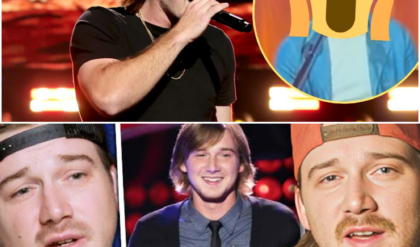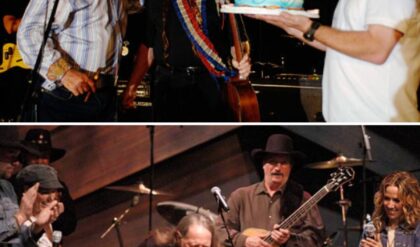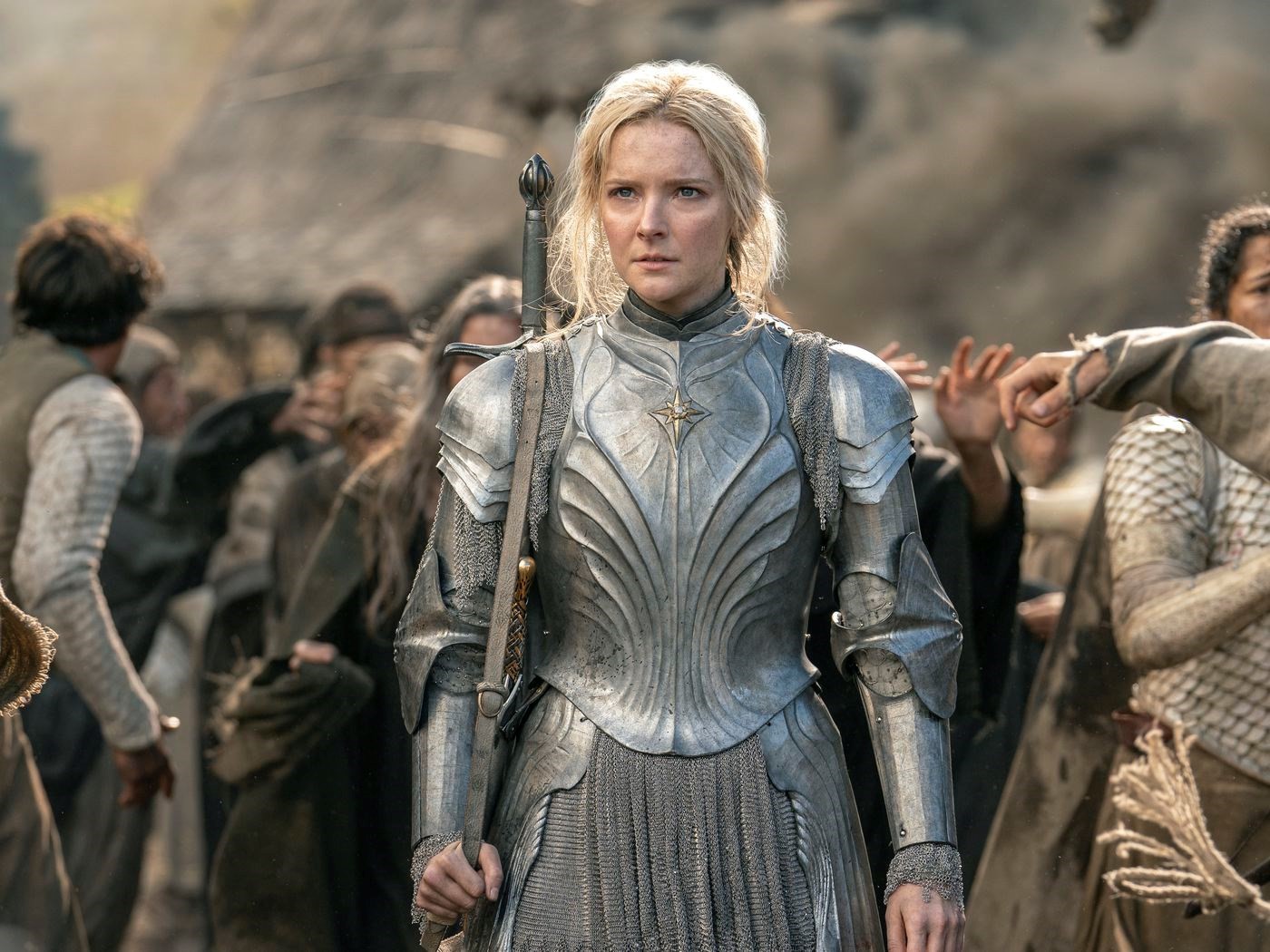
As the new Lord of the Rings series finally launches, the Welsh actress who plays Galadriel tells AnOther all about her role – from learning Elvish to what it was like on the set of the £615-million production
For many people, September 2 is D-Day. It’s when, for the first time in 19 years, we’re being taken on a new trip to Middle Earth, as the new series The Lord of the Rings: The Rings of Power arrives on Amazon Prime – two decades after Peter Jackson’s trilogy of films was released (in 2001, 2002 and 2003 respectively).
Maybe you’re one of those people; maybe you often imagine a scenario in which you’re offered a one-way ticket to Middle Earth and take it without a backward glance or courtesy message in the family WhatsApp group, telling them where you’ve gone. And maybe you’ve been pouncing on every teaser and trailer that has been released, and been pouring over magazine articles, TikTok videos and podcasts.
Or maybe you’re not. Maybe hobbits just aren’t your thing and you find the whole thing a bit embarrassing.
If you belong in the latter camp, then I’m here to quickly tell you why you should care about The Lord of the Rings, before introducing an interview with a lead actor from the new series, Morfydd Clark.
Originally published in 1954, The Lord of the Rings is a fantasy book, yes, but it also speaks heavily about reality; about history. It is considered one of the great novels about life in the 20th century, crystallising many of the collective anxieties that were felt between the end of the Victorian era and the beginning of the Cold War. It looks at war (Tolkien lived through both world wars, served in the first and fought in the Somme) and modernism; it explores changes in the landscape and the destruction of the environment; it even touches on more marginal issues like eugenics.
Tolkien was a devout Catholic and so there’s a spiritual reality to his book too, which is also regarded as the last great Christian novel. It delves into life and death, meaning and purpose, the fight for ‘good’ as well as the folly of the powerful, the power of the humble, and hope. And while much of the western canon (or popularly consumed western canon), centres and celebrates romantic love, this book and the films that followed are an unequivocal celebration of the platonic. It is about friends – of different ages, races, backgrounds and temperaments – who fight with each other and for each other, for that common good.
A professor of Anglo-Saxon at Oxford, Tolkien wrote the book to fill what he saw was an absence of an English mythology (he blamed the French, or rather the Normans, for this). He was responsible for bringing Beowulf – the epic poem considered to be the first important work in English literature – into the public consciousness and also for authoring the book which became the best-selling English-language novel of the 20th century.
So if you’re distinctly anti-hobbit, hopefully this explains some of the obsession about Tolkien’s Middle Earth and excitement about this series, which, at the latest estimate, cost $715 million (£615 million) to produce (Jeff Bezos, for all his innumerable faults, is a big Tolkien fan).
Morfydd Clark, the Welsh actress and breakout star of the 2019 cult film Saint Maud, has the lead role in Rings of Power, which is set in the Second Age of Middle Earth (around 4,959 years before The Lord of the Rings) and is based on the material in the margins of the books. In it, she plays an elf named Galadriel, who is on a mission to hunt down the collaborators of the wicked god Morgoth and his apprentice Sauron, and to forge an alliance between elves and men, who at this period in the history of Middle Earth are not living in harmony with one another.
As one of the most important characters in the series, Clark stands at the precipice of global stardom when we speak. Here, she talks about how she landed the role, shares some of her favourite memories from filming and explains why she thinks Tolkien’s world still has so much resonance today.
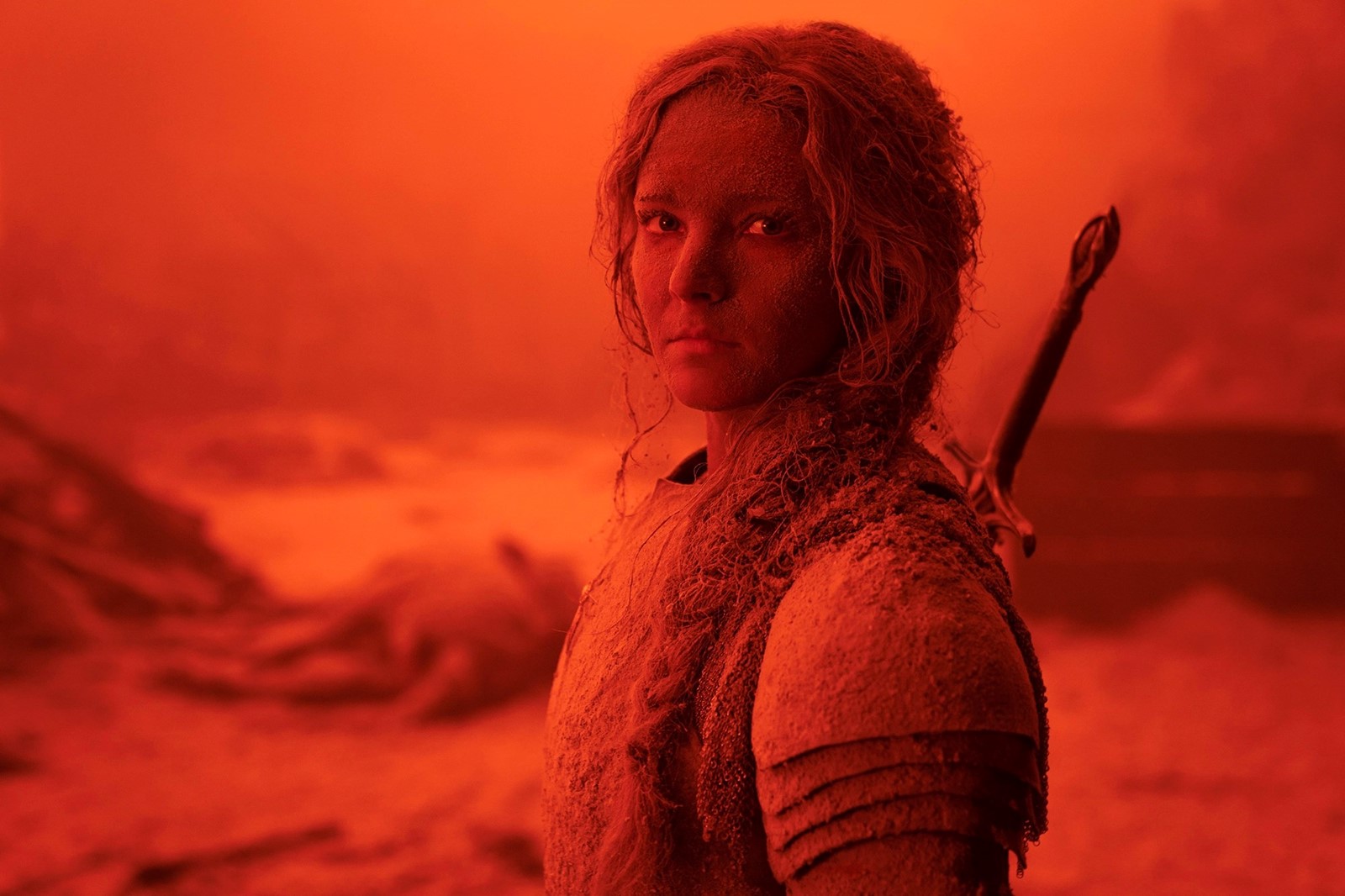 Rings of Power, 2022Courtesy of Amazon Prime
Rings of Power, 2022Courtesy of Amazon Prime
Ted Stansfield: What’s your relationship to Tolkien’s Middle Earth?
Morfydd Clark: I’ve always loved fantasy. My dad read The Hobbit to me in year six, because he knew the films coming out, and I just loved them. And we always used to listen to the BBC Radio [4] version and my dad would be like, ‘you know the man playing Frodo in this [Ian Holm]? He playes Bilbo in the film.’ So I had it coming at me from lots of angles.
TS: How did you come to be auditioned?
MC: I swear people had been talking about it for a long time, even when I was still at drama school. And then, years later, I got an audition. It was all quite vague – they just said they wanted actors who had experience in Shakespearean language – that was all the info we got.
I was in the waiting room and one of the people sitting next to me asked if I knew what this was for, and I said no, and she said it was for The Lord of the Rings. I had to go to the toilet to have a word with myself. I was like, it’s OK, you’ve been prepping for this for your whole life. I went in and did it, and was auditioning for quite a while, and then, eventually, I was in New Zealand.
TS: How did you find out that you got it? And how did you feel?
MC: I was on my way to Toronto, where [The Personal History of] David Copperfield and Saint Maud were premiering. I was told that by the time I got off the plane, I’d have an answer. But when I got off the plane, I still didn’t have one. Later, I was getting my make-up done for the David Copperfield premiere – which already is quite weird because you kind of feel like you’re being attacked by a glam octopus – and my hotel room phone rang, and I was told that I’d got it.
Then I went to the premiere, but I fainted during the Q&A, because I was fresh from it. Thankfully, I managed to get off stage. There’s a YouTube video where you can see me wandering off, and then you hear my mic drop. I was caught by a lovely Canadian security guard who told me I fell very gracefully. It was all very overwhelming.
“Well, because I was a fan of the films, it felt like going on a pilgrimage. I was like, finally I’m here!” – Morfydd Clark
TS: Was it hard not to tell people?
MC: Yeah. But I didn’t know who I was playing at that point. It wasn’t till I got to New Zealand that I found out. So that was strange. I got on a plane to the other side of the world, knowing very little.
TS: And so what was it like when you landed?
MC: Well, because I was a fan of the films, it felt like going on a pilgrimage. I was like, finally I’m here! New Zealand is just glorious. It’s so inspiring. It felt like it was constantly feeding me with its beauty.
TS: How did you approach playing Galadriel?
MC: I’ve always been obsessed with the idea of immortality, and whether I’d want it or not. So I think for me here age was what I focused on – the elves don’t miss anything. It always makes me sad that we all have to miss everything with our little slice of time here. So it was looking at how she was very old, but also not as old as she becomes. What I focused on was how elves and men are not, at this point, in harmony. The Galadriel in The Lord of the Rings trilogy is living in a world that is peaceful and makes sense, and so she can be relatively at peace. For my Galadriel, she felt like there could be something, that there could be a different world. And also, she’s seen quite a few worlds already. So I tried to find a mixture of age and knowledge, and some sort of naivety within that.
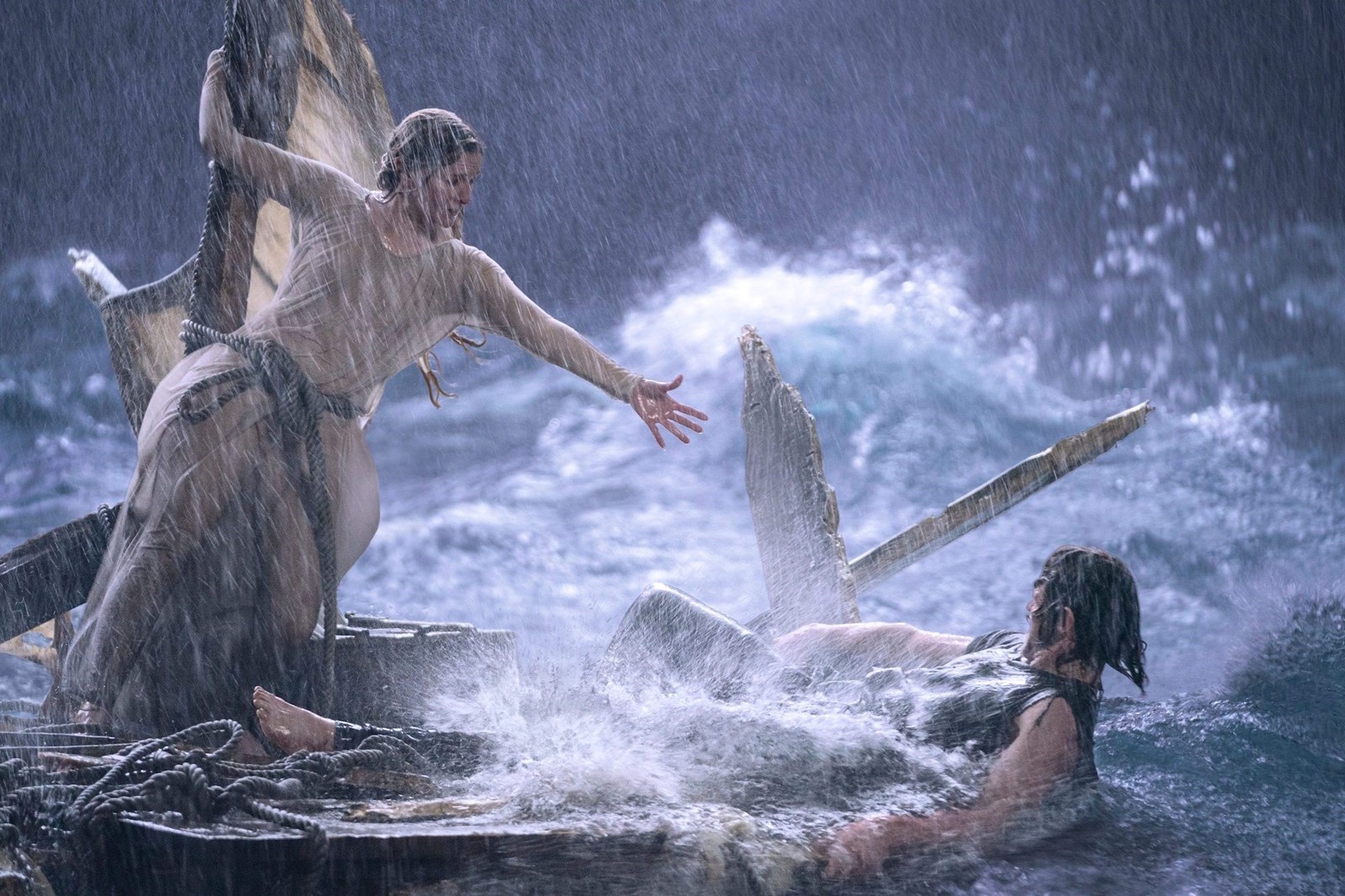 Rings of Power, 2022Courtesy of Amazon Prime
Rings of Power, 2022Courtesy of Amazon Prime
TS: Did you have to speak any Elvish?
MC: I did. I’ve always been obsessed with Elvish because one of them [Sindarin] is based on Welsh. But we actually had to speak the one that was based on Finnish [Qenya]. I would say, ‘Can’t we do Sindarin?’ and Leith [McPherson, the dialect coach] would say, ‘There’s no way I’m letting you speak Sindarin, it’s against the law, they wouldn’t be speaking that.’
TS: No way. How much did you have to speak?
MC: I can’t say exactly. But we had Elvish lessons with Leith, even if we weren’t going to be using it. Because we spoke a lot about how having another language affects the way you see things and feel things. The Elves are always described as being not emotionless, but having that poise, while the hobbits are the creatures that are full of emotion and openness. We asked where the Elves’ emotion lies and spoke about how it probably lies in their original language, and we explored that together. Tolkien started with the languages, which is amazing. And Leith also worked on The Hobbit, so she is very well-versed with Middle Earth, and the languages are a particular fascination of hers.
TS: Did it help that you’re bilingual yourself and speak Welsh?
MC: Yeah, definitely. When I heard that Tolkien liked Welsh, that was a [source] of huge pride for me. It made me more proud of my language. And you know, the poetry in Wales and the songs in Wales, I think they feel like Middle Earth. And so I felt really lucky to come at it from that angle. But also, there were two other Welsh people [Owain Arthur and Trystan Gravelle] in the show with me, so I spoke a lot of Welsh even though we were in New Zealand.
“It’s obviously daunting. Galadriel is like a legend. She is an actual legend in Middle Earth, but also a legend in our world. And then Cate Blanchett is a legend who played her, so the shoes were enormous” – Morfydd Clark
TS: How did you relate to Cate Blanchett’s portrayal?
MC: I feel like Tolkien was coming at me in so many different ways, like it has been explored in those different mediums. I just felt really lucky to have all of that. Watching those films at the age I did, it was in my imagination; I felt really inspired by not just Cate Blanchett’s portrayal, but the films in general. Every way that I’d previously managed to get Tolkien into my veins felt like it was setting me up to do well.
But yeah, it’s obviously daunting. Galadriel is like a legend. She is an actual legend in Middle Earth, but also a legend in our world. And then Cate Blanchett is a legend who played her, so the shoes were enormous. But I also felt like I was playing someone who had a wealth of stuff to research.
TS: The first season has cost around £615 million. What kind of moments gave you a sense of the scale of this production?
MC: Yeah, that didn’t stop. I felt like that was just a constant like, ‘wow, wow, oh my gosh.’ First, the amount of people – I did feel like I was part of a village sometimes. And it was quite weird at times, being led through in my Galadriel finery, I felt like a medieval princess, not someone pretending to be one. The costumes were a huge part of it for me. I remember when I found out Kate Hawley, who did Crimson Peak, was doing it, I was like, that’s perfect, because those outfits are so detailed and just so glorious.
Kate was like a scholar of Tolkien lore. When I had my first fitting she was like, ‘Do you want to come into my costume closet,’ and it was like Aladdin’s cave. There were crystals hanging everywhere for all the dwarf stuff, to inspire her for that, then for Númenor there were all these shells and things – every bit of wall was just covered. I felt like a child being shown Santa’s grotto. And I think it was the detail that people were able to get into because of the budget. And that also went into the set design. And the greens department was also huge – the people who do the plants. Obviously for Middle Earth it’s so important, and so there were all these greenhouses growing all these flowers that we’d eventually use in episode seven or eight. It was amazing to see all that.
TS: Did you have to do a lot of riding?
MC: I did. I’d never ridden before. My mum did her back in falling off a horse when she was around 21, so I was never allowed near them. And I got to New Zealand and was like ‘I’m riding horses!’ And then Covid happened and we had to stop filming and we had time that we didn’t expect to have, and I spent a lot of that time on Titan, my horse. In terms of playing Galadriel it was amazing to be able to start to feel so comfortable on a horse and really get to know this horse who was so beautiful. If I ride again, I’m going to realise I’m not as good as I thought I was because Titan is a golden boy. But also I was just riding being like, ‘oh, this is what my mum used to do. This is what she used to love doing.’ So I felt a connection to her that I’d never experienced before.
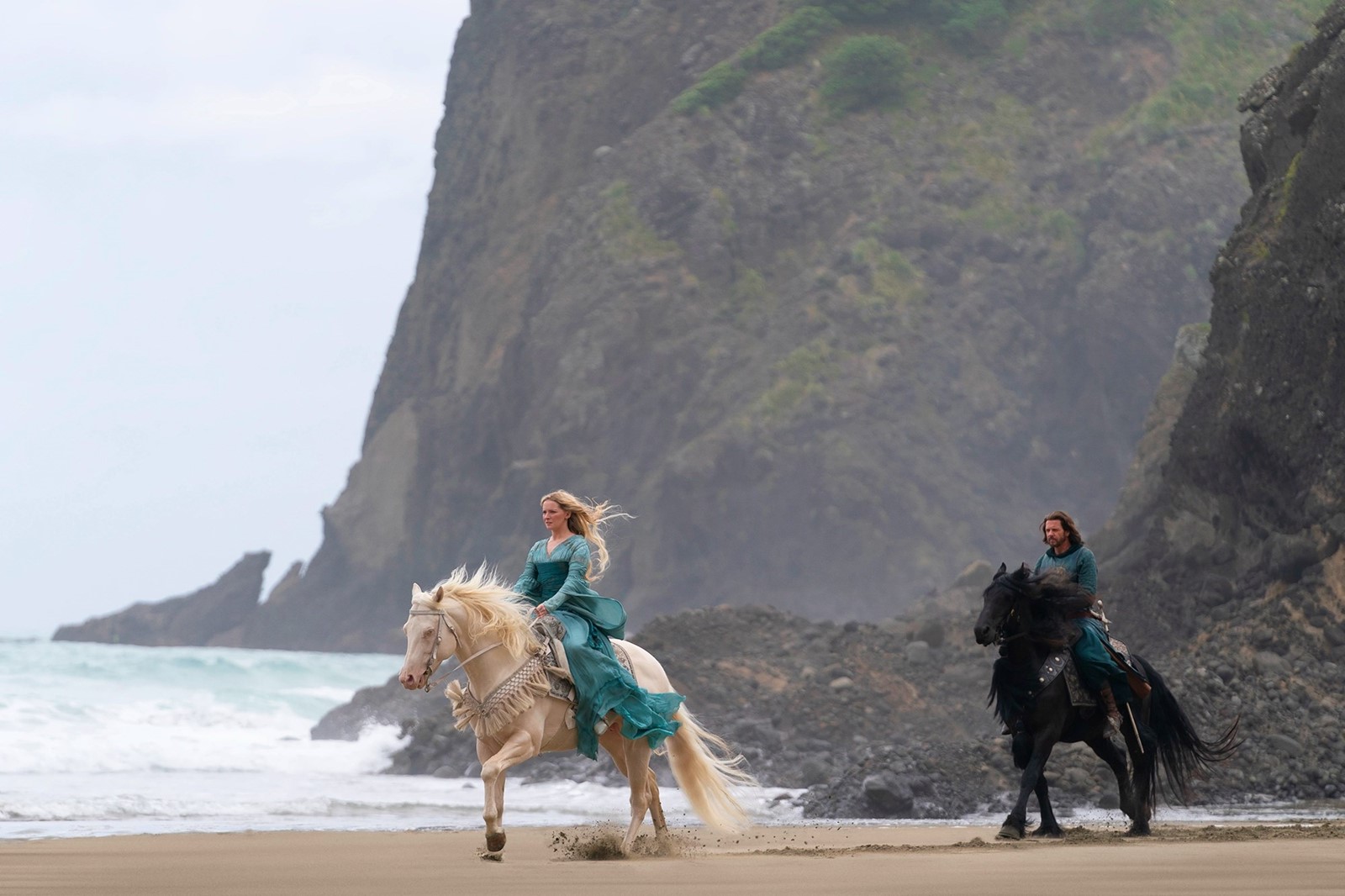 Rings of Power, 2022Courtesy of Amazon Prime
Rings of Power, 2022Courtesy of Amazon Prime
TS: Do you have any favourite memories from filming?
MC: Riding Titan was one of them. I remember there was one time when some sort of butterflies had just hatched, there was just loads of them around me while I was riding him. And I was just like, ‘This can’t be real. Surely life can’t be this beautiful.’
TS: There was a bit of a backlash to the diversity of the cast, even though there is diversity – particularly in terms of skin tone – in the books.
MC: Yeah. I’m just happy that ten-year-olds will be seeing something that reflects our world. And while there was a backlash, there were also so many people who were really excited that there were female harfoots, female dwarves; Black elves, Latina elves; Black dwarves … There was a huge amount of joy to the casting, as well as the backlash.
TS: Are there or will there be any queer storylines?
MC: I can’t discuss storylines, for fear of exploding. But we have seasons ahead of us, and lots to explore. And I’m really excited about what we’re going to see in Middle Earth.
“I remember there was one time when some sort of butterflies had just hatched, there was just loads of them around me while I was riding Titan. And I was just like, ‘This can’t be real. Surely life can’t be this beautiful’” – Morfydd Clark
TS: What themes in Tolkien’s stories do you think are particularly relevant for today?
MC: If you want to see different representations of masculinity, look at the hobbits. That’s always something that I loved about The Lord of the Rings trilogy: that there was a group of people who just want to look after each other, and were really kind and emotionally open and brave.
And one of the many reasons Tolkien wrote these books was because he was in love with the natural world. And I think that’s something that really stuck out to me during filming. It was an endeavour to protect and create a better world at the same time, which I think Tolkien did beautifully. I think that that hopefully crosses over into our series – that desire, and the wonder he had for the natural world.
TS: House of the Dragon is coming out soon too [at time of publication, the series has begun airing], do you feel a sense of competition with the show?
MC: I’ve just been working on a job with Matt Smith and there was lots of this. [Laughs.] I love Game of Thrones, so I’m just ignoring that I’m in one of them. As a fantasy fan, I’m loving it. Also George RR Martin was really inspired by Tolkien, but created a very different world. I love watching Game of Thrones and I love watching The Lord of the Rings, but they don’t give me the same thing. I feel really excited that we’re in a fantasy heyday and for me that’s great because I’ll be watching it all.
TS: Do you think you’ll get tattoos like the cast of Peter Jackson’s films?
MC: There was actually one conversation [about this] or people came up with like tattoo ideas, and then it just became [this] massive debate about what it should be, so I don’t think we’re quite there yet as cast.
